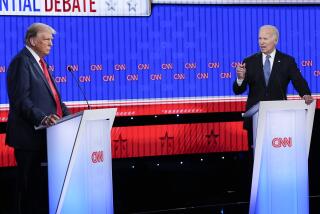A Soggy Substitute
- Share via
The problem with the 1988 presidential campaign is not just the sterile structure of the debates or with the quality and character of the candidates themselves, but the fact that both George Bush and Michael Dukakis have been wound up so tightly and programmed so precisely by their handlers. Even when they try to be relaxed and human, as each did during Thursday night’s debate, it seems rehearsed and calculated.
The debate need not, and should not, be viewed as the climactic event of the campaign. These men have been nit-picking the issues, not grasping them. They spout sound bites and labels, but no substantial themes. The people need more from these candidates than they are getting.
Dukakis is not John F. Kennedy. Bush is not Ronald Reagan. This is not 1960 or 1980. No election is quite like the last one. What voters do not get from either candidate is a coherent vision of a changing America and its needs in a changing world.
It is impossible to know the debate’s effect on the election or where the campaign goes from here. Even though Dukakis failed to make a convincing case for his candidacy, and Bush did not suffer some knockout blow, that does not mean that Bush now can coast until Nov. 8. Nor can Dukakis whine his way into the presidency by complaining about being labeled a liberal or by carping about Dan Quayle.
Canned media strategy has been everything. The sacred writ of the campaign managers is that if things are not going badly, they are going well; don’t be bold because that is too risky. That is not good enough.
Bush has established that he can seem gentle and kindly. But this is not a contest for favorite uncle. The strains of the past eight years sound comforting, but a little fine-tuning of the Reagan agenda will not solve the problems of the homeless or young families who cannot afford a house. Just assuming that the economy will continue to be strong will not make it so. Feasting at a buffet of weapons will not in itself force more arms concessions or improve relations with the Soviets. Bush needs to rationalize these notions and show the electorate where they will lead in the 1990s.
The challenge for Dukakis is even greater. Dukakis is more realistic than Bush in discussing some specific issues and the items neglected during the Reagan years. But he fails to complete his thoughts, to connect the dots and to demonstrate how his proposals will lead to a nation in which more people share in the economic prosperity while maintaining a strong defense with a real prospect for achieving arms reductions with the Soviets. Dukakis cannot persuade Americans to vote for change unless they are convinced that such change would lead to a better life for both them and their country.
Three weeks can be an eternity in a presidential campaign. There is time for the candidates to break out of their protective campaign cocoons and engage in free-wheeling, extemporaneous dialogue for a couple of hours every day. Let them talk with average voters, professors, the media, members of Congress, Democrats and Republicans. Let them talk about real presidential issues in depth. Let the voters see the real George Bush and Michael Dukakis. Let them be themselves.
More to Read
Get the L.A. Times Politics newsletter
Deeply reported insights into legislation, politics and policy from Sacramento, Washington and beyond. In your inbox twice per week.
You may occasionally receive promotional content from the Los Angeles Times.










